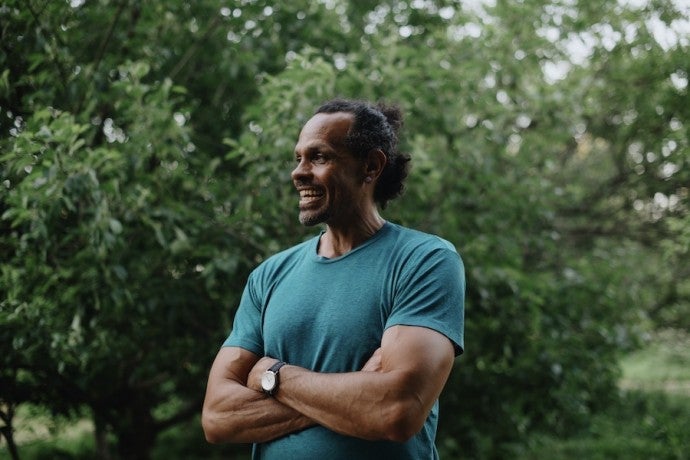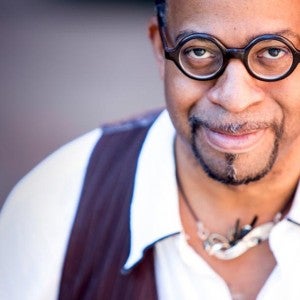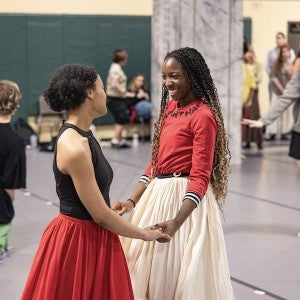Applications are still open for Arts Camp and Arts Academy. Programs fill quickly—submit your app today!
Ten questions with visiting writer Ross Gay
The bestselling “Book of Delights” author gives advice to young writers and shares his biggest inspirations.

Interlochen is known around the world as a vibrant destination for artists and creatives of all kinds. Each year, the institution welcomes a lineup of highly-regarded guest artists in creative writing, dance, film & new media, interdisciplinary arts, music, theatre, and visual arts. This year, the Creative Writing department, in partnership with the National Writers Series, welcomes award-winning poet and essayist Ross Gay.
Ross Gay is the author of four books of poetry: Against Which; Bringing the Shovel Down; Be Holding, winner of the PEN American Literary Jean Stein Award; and Catalog of Unabashed Gratitude, winner of the 2015 National Book Critics Circle Award and the 2016 Kingsley Tufts Poetry Award. His first collection of essays, The Book of Delights, was released in 2019 and was a New York Times bestseller. His new collection of essays, Inciting Joy, will be released by Algonquin in October of 2022.
He will be visiting Interlochen on April 12 to offer a masterclass for young authors, as well as an evening reading and discussion as part of the National Writers Series that is open to the public.
Here, Gay reflects on finding joy in the everyday, explains how to discover one’s writing voice, and shares his favorite sources of inspiration.
Why do you write?
Gay: I have questions. Writing is how I think. My best thinking has happened in conversation with other people and conversation with myself and I think that's usually what writing is.
What are some themes you find yourself returning to again and again in your writing?
Gay: Family/relationships. These days I'm writing a lot about sports, actually—basketball. Gardening. Living and dying. I'm interested in how things turn into other things.
Many of your poems circle around joy and gratitude—finding beauty in this world and praising it. Given that the news headlines these days, and the real world, can be dark and distressing, how do you justify this focus on brighter things?
Gay: Sources of delight are also sources of survival. And life is complicated. In order to accurately represent or engage with life, it means that you are going to be engaging with what is both profoundly sorrowful and also what is not. If the trees bloom this year, that is a thing to take note of, just as it's a thing to take note of if your mother or your best friend dies. Those are all things to take note of; they're not mutually exclusive.
Sources of delight are also sources of survival.
Tell us about your new book, Inciting Joy. What’s it about?
Gay: It's about me wondering: what are the things that we do that incite joy, that incite this practice of entanglement? So I have chapters about pickup basketball and skateboarding and gardening and school and cover songs. And they're all these ways to wonder about these things that we already do, that we all are familiar with, and how they might in fact be practices of entanglement. What about the way we garden and share things with each other? What about the way we play pickup basketball, when in one game someone is against you and then, two games later, you’re on the same team?
How do you discover and refine your voice as a writer?
Gay: I would suggest dispensing with the idea of one's own voice, and I would wonder more about what are the many voices you might have available to you. Also, I’m interested in the different ways people talk. The idea of a singular voice, in addition to being kind of phony, is a little bit lonely, because it disallows all of these other voices that we have. You talk a certain way to your mother, and you talk another way to your best friend, and you talk another way when you're ordering pizza, and those things all slamming up against each other is kind of neat to me.
If there's any way to decrease the expectations, and also to decrease one's own desire to be excellent—if you give up the idea of what it should be—that then allows things to flow.
What are some of your favorite writing exercises or ways to break writer’s block?
Gay: Writer's block, it seems to me, comes from perfectionism. Often, it comes from a kind of sense that you know what you need to write but you just don't know how to do that. If there's any way to decrease the expectations, and also to decrease one's own desire to be excellent—if you give up the idea of what it should be—that then allows things to flow. I like to introduce exercises that we're not going to be excellent at. With groups lately I've been doing a lot of opposite hand drawing. We're just going to be goofy, we're going to play. Those feel like muscles that you have to cultivate, especially as you get the hang of writing.
What are your favorite sources of inspiration?
Gay: Conversations. Dreams. I like walking around. Having a little bit of time without obligations is really inspirational to me, meaning that I have time to sit down and write. That’s very inspirational!
What are you looking forward to about working with Interlochen students?
Gay: I'm just excited to get to hear what these young folks are thinking about. And also to have conversations about what we're working on, all of us. I'm curious to see what they’re going to say.
If your students get nothing else out of your workshops, what do you hope they retain?
Gay: A greater sense of care for one another. First and foremost, that's what I feel like my classes are about: practicing care.
What advice would you give to aspiring writers?
Gay: Study what you love, think hard about what you love, and go toward that.
Buy tickets for A Conversation with Ross Gay.
Learn more about Creative Writing at Interlochen Arts Academy.





